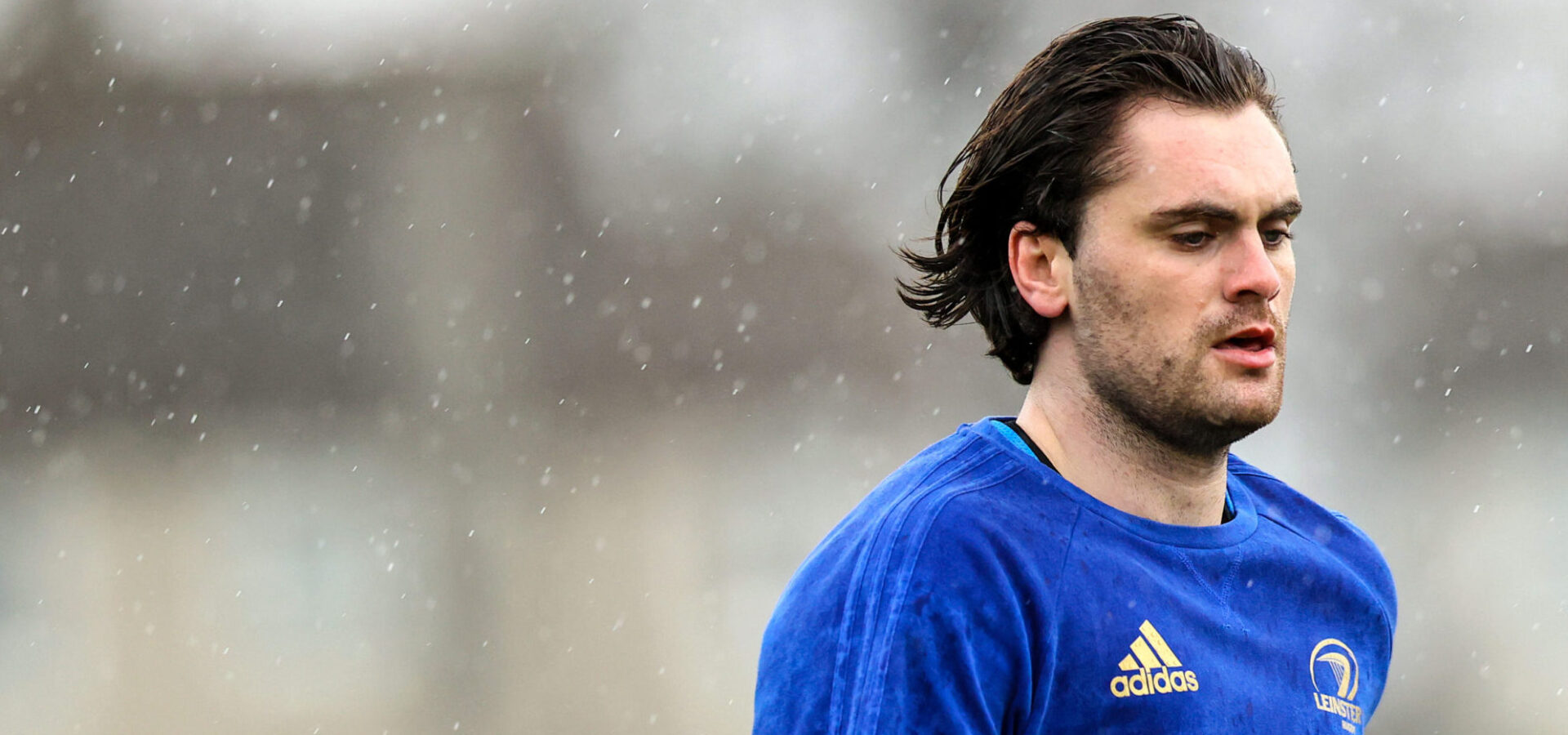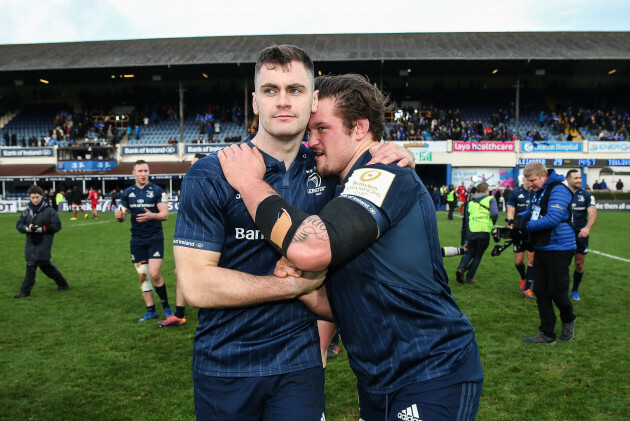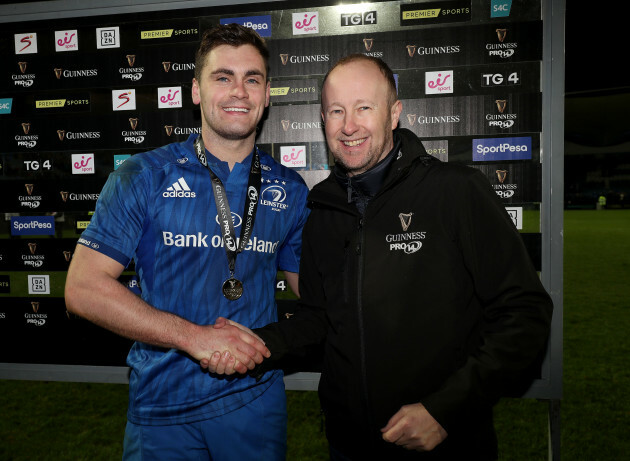News
“I played in front of thousands of people. Nobody can take away those memories. Nobody”

Conor O’Brien had the world at his feet when misfortune struck at 24. The former Leinster star refuses to look back in anger at a career cut short by injury.
HE WAS THE boy at the back of the class. I was the eejit trying to supervise it.
It was 2012, a time when your correspondent briefly wandered into a new profession in the way unsuitable people sometimes end up in jobs they’re not remotely good at, like Liz Truss, Donald Trump.
Well, that was me and teaching. I didn’t stay long in the post – then again neither did Liz – and while none of my brainwave ideas sunk a nation’s economy, that’s where the credit ends. Technically I wasn’t a teacher as such – “just a supervisor” as my pals liked to remind me, there to cover a few classes.
Irrespective of the limited status, it was the best job I ever had, not because I was any good at it (I wasn’t) but because the school was brilliant, the teachers supportive; the kids hilarious.
History was the only subject I had a clue about. “Well, that makes sense because you are the most backward person I know,” says The Irish Sun’s Neil O’Riordan, who I consider a fine judge of character and close friend.
One day I ended up supervising geography, the equivalent of that Father Ted episode when Dougal officiated at a funeral. All that was missing were the flames. Certainly the gormless look was present. “To be fair, you’ve had that off to a tee for years,” says O’Riordan.
Seriously, I was the worst reader of a map since Christopher Columbus sailed for India before ending up in America. Pointing at a splash of blue, I continually referred to the Pacific while my ruler hovered over the Atlantic.
The boy at the back of the class politely pointed out the mistake. Mortified, I consoled myself with the knowledge that I was about to return to sports journalism and would never see the kid again.
And that was how it panned out …until last Thursday.
We were 45 minutes into an interview when I clocked it was him, no longer a schoolkid, now a 26-year-old adult.
“Fuck,” I thought. “Fuck!”
He was talking about a serious issue, the injuries that ruined a promising rugby career, the passion that drove him to come back from surgery not once, not twice, not thrice, but four times and all the while I was wondering ‘does this fella remember the fool who didn’t know his Pacific from his Atlantic, his arse from his elbow?’
By the looks of things, I’d got away with it as Conor O’Brien sipped from his coffee cup while telling the story of how he fell in love with rugby almost by accident, having first shone as a hurler and Gaelic footballer.
He came through the club system, another graduate of Mullingar RFC, plucked from there to represent an Under 16 Midlands XV. “That was when I started to take it seriously,” he tells you, which is remarkable when you consider that three years later, he was a key member of the Irish Under 20 side that reached a World Cup final.
That team – captained by James Ryan and backboned by Andrew Porter, Jacob Stockdale, Hugo Keenan, Will Connors, Max Deegan – was one of the best underage XVs Irish rugby has ever had.
“There was so much talent but so little ego,” says O’Brien, who saw first-hand what made the stars shine.
“They were the same then as they are now,” O’Brien says. “Each of them had a serious work ethic. There is no off switch.”
Here are his thoughts on Keenan: “He is a freak when it comes to his recovery (after a game). He gets the compression pads on; goes into an ice bin. He won’t put a bad bit of food in his body; he always has his water bottle with him, always gets his 10 hours sleep.”
And what about Stockdale? “Jacob had a bit of an aura about him, knew when he walked onto a field that he had the beating of his man. He had this formidable mental strength, just like Andrew (Porter).
“Like, I have never been in a scrum and never want to be; but for Andrew to seamlessly switch from loosehead to tighthead and then back to loosehead, that just tells you everything you need to know about his mindset. There’s no fear in him, no doubts.
“James (Ryan) was the same. During that (Junior) World Cup, James put 14 bags of ice in his bath night after night before sitting in it. He was reading The Power of Now book during that tournament. In one way, he was intense; at the same time it was easy to become really good mates with him.
“His physicals are incredible, nine per cent body fat at 115kg. He was always a freak of nature when it comes to athletics, a generational player. His leadership was also obvious. He did not have to say a whole lot; he just commanded respect and if he ever lost his temper, you sat up and took notice. He was always a really impressive captain.”
What O’Brien liked about that Ireland set-up was the ability of these different personalities to gel, he the kid from the Midlands; the boys from Ulster; those from rural backgrounds in Munster and Connacht; the city lads from Dublin.
Beyond rugby’s bubble, there’s a deep-lying perception that it’s a game for snobs, the playground for society’s elite. Yet here was someone who wasn’t part of the Dublin 4 set, educated beyond the private school system and who fitted in seamlessly, first with the Irish Under 20s, latterly with Leinster.
Right from the start he felt at home with the four-time European champions. “Finish your education,” they advised him, as he completed an economics degree at UCD, while mastering a diverse range of subjects such as the breakdown, drift defence and counter attack.
Will Connors and Jimmy O’Brien became housemates, Hugo Keenan a neighbour, Adam Byrne a big supporter as he won an unexpected call-up for a Pro14 game against Glasgow in November 2017. “You’ve earned the right to be here,” Byrne told him before the game, one Leinster lost by ten points.
“It was the worst match I ever played in my life,” O’Brien remembers. “I tried a crossfield kick in their 22 and it went straight into touch. It was crazy stuff. I basically forgot how to play rugby that day. It wasn’t nerves; it was really just a blur. I never thought I’d play for Leinster again.”
That he did so tells you plenty about him but also the club.
First, there was a review. He accepted the advice. Then there was an internal chat, a decision to forget what he did wrong. “If I carried the memory of that performance around with me, I’d have been in a fairly bad spot for the rest of my career.”
Soon he was in a good place. A year after the Glasgow disaster, he went on a run where he got to play 14 games for the province in a season when they reached another European Cup final and won yet another Pro14 title.
He was on his way, ahead of Keenan and O’Brien in the development race, fast-tracked into a Champions Cup squad for a pool game against Toulouse. Ten years earlier, he’d been in the same stadium, as Leinster faced the same opponent, only on that occasion he was one of the minis, there to entertain the crowd at half-time. “I got more minutes with the minis than I did with Leinster,” he jokes.
Beyond the laughter, deep down there’s a pride in what he did that day, earning Leo Cullen and Stuart Lancaster’s trust.
“From what I’m told the club used to have a name for being a bit flashy, way back in the day,” says O’Brien. “Now I can’t say if that was the case. What I can say is that I never saw any egos there, not once.
“You didn’t come across fellas who thought ‘I’m the biz’. There’s humility in that set-up. From the day I went in there, we were constantly reminded how privileged we were, how we couldn’t take things for granted. The culture was very good. I never come across any elitism. You can’t have egos in a place like that.”
Part of you wonders how this can be the case, remembering the old Eamon Dunphy line: “Show me a player with no ego and I’ll show you one with no medals.”
Yet O’Brien is an eyewitness to what went on behind the closed door. During his years in there, he sat in the same space as Isa Nacewa, Jamie Heaslip, Tadhg Furlong, Johnny Sexton, Rob Kearney and about 50 other internationals.
He saw change in terms of the faces that came and went, not in their ethos.
“A big part of what keeps people grounded is that the selection process is so hard to begin with. To even win a contract, those with the most drive as well as the most talent get chosen.
“The attitude then is that you don’t take it for granted; you go after it every day like a dog with a bone and when you have that sort of attitude, it is easy to go to work. I’ve seen what goes on, how the standards of a round 7 game in the URC is no different to preparation to a Champions Cup semi-final.
“Mental fatigue can hit teams because it is bordlerine impossible to go at it every day, year after year. So, to keep that standard going, you need desire in your stomach. You need to want to shine on a Tuesday morning in training, knowing you are about to get absolutely flogged. I loved being part of the place.”
He was part of it for five years, peaking at 22, when the injuries that would later torment him, were blissfully absent. He scored five tries that season, was man of the match against Ulster, picked against Munster and Connacht, full of running, full of confidence.
“You think that is it for life. But when you get to that stage of your development, you need to double down. Some people think they can take the foot off the gas. Well, you can’t. You can’t have that extra slice of pizza, you can’t leave the gym ten minutes earlier than normal. You have to stay at it.”
To his credit he did, not just when things were going well, also when they were going terribly, when in January 2020, away to Ospreys, he went in for tackle, and his body twisted into a position where he was leaning backwards while his foot got stuck in the ground, his hamstring torn off the bone.
Out for six months, he came back and tore another muscle in his right leg. Still he wouldn’t stop. Something persuaded him to keep coming back, to chase that dream. It looked like he’d get there, until his ACL went in his left knee. Time to quit? Never. He tried again. This time his left hamstring went. More surgery. “And it just won’t heal. The pain I get when I run at high intensity, it’s just severe. I was forced into the decision (to retire).”
He doesn’t want your pity when he says that. Quite the opposite. Even when his one-time supervisor bluntly asks how it is to know that at 26 he’ll never be able to play again, he’s fine with the unsubtle line of questioning. “I’m great, despite hearing that,” he laughs.
“I would have liked to have kept going and doing what I loved but once you are constantly injured, stepping away is actually a bit of a release.”
Comfort comes from what has happened since, a job with a software company, TEKenable, a culture he compares to Leinster’s.
“It is easy to step away when you step into something positive. Life is very good. I had that period of why me? After a while I was able to digest that I was just unfortunate. There is something else to do. I’ve stepped into the working world and am loving it.
“As for Leinster, as for rugby, I look back on it with such fondness. I played in front of thousands of people. I’ll always have that. Nobody can take away those memories. Nobody.”
Interview over, he then asks about your life, your job, the kids, the family cat, the summer tour of New Zealand where you saw Ireland beat the All Blacks. You tell him about the raucous atmosphere at Dunedin and Wellington, the cocktails after the wins before we get to the big reveal, how the highlight of the trip was four days staying in St Clair, in an apartment with an ocean view.
“The Pacific was just 100 metres from the front door,” you say.
There’s a lengthy silence, a smile and a knowing look.
“The Pacific?” he laughs.
He’d copped. It was time to press stop on the tape recorder.
Back to News
Latest Posts

Player Development Programme Review

Finding Hope

Highlights: February 2025


















